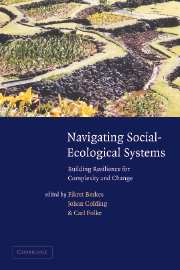Book contents
- Frontmatter
- Contents
- List of contributors
- Preface
- Acknowledgements
- Foreword: The backloop to sustainability
- 1 Introduction
- Part I Perspectives on resilience
- Part II Building resilience in local management systems
- Part III Social-ecological learning and adaptation
- Part IV Cross-scale institutional response to change
- 11 Dynamics of social–ecological changes in a lagoon fishery in southern Brazil
- 12 Keeping ecological resilience afloat in cross-scale turbulence: an indigenous social movement navigates change in Indonesia
- 13 Policy transformations in the US forest sector, 1970–2000: implications for sustainable use and resilience
- 14 Synthesis: building resilience and adaptive capacity in social–ecological systems
- Index
- References
14 - Synthesis: building resilience and adaptive capacity in social–ecological systems
Published online by Cambridge University Press: 13 August 2009
- Frontmatter
- Contents
- List of contributors
- Preface
- Acknowledgements
- Foreword: The backloop to sustainability
- 1 Introduction
- Part I Perspectives on resilience
- Part II Building resilience in local management systems
- Part III Social-ecological learning and adaptation
- Part IV Cross-scale institutional response to change
- 11 Dynamics of social–ecological changes in a lagoon fishery in southern Brazil
- 12 Keeping ecological resilience afloat in cross-scale turbulence: an indigenous social movement navigates change in Indonesia
- 13 Policy transformations in the US forest sector, 1970–2000: implications for sustainable use and resilience
- 14 Synthesis: building resilience and adaptive capacity in social–ecological systems
- Index
- References
Summary
Introduction
A weekly magazine on business development issued an analysis of Madonna, the pop star, and raised the question ‘How come Madonna has been at the very top in pop music for more than 20 years, in a sector characterized by so much rapid change?’ A few decades ago, successful companies developed their brand around stability and security. To stay in business this is no longer sufficient, according to the magazine. You must add change, renewal, and variation as well. However, change, renewal, and variation by themselves will seldom lead to success and survival. To be effective, a context of experience, history, remembrance, and trust, to act within, is required. Changing, renewing, and diversifying within such a foundation of stability and maintaining high quality have been the recipe for success and survival of Madonna, and for rock stars such as Neil Young and U2. It requires an active adaptation to change, not only responding to change, but also creating and shaping it. In the same spirit, Sven-Göran Eriksson, coach of several soccer teams in Europe, claimed that it is the wrong strategy not to change a winning team. A winning team will always need a certain amount, but not too much, of renewal to be sustained as a winning team. Sustaining a winning team requires a context for renewal, or ‘framed creativity,’ borrowing from the language of the advertiser.
- Type
- Chapter
- Information
- Navigating Social-Ecological SystemsBuilding Resilience for Complexity and Change, pp. 352 - 387Publisher: Cambridge University PressPrint publication year: 2002
References
- 62
- Cited by



